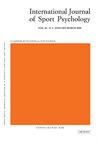了解青少年摔跤运动员参加集训营心理变化的混合方法调查
IF 0.6
4区 心理学
Q4 HOSPITALITY, LEISURE, SPORT & TOURISM
引用次数: 2
摘要
研究表明,训练环境中产生的逆境可以培养青少年运动员的心理韧性(Bell、Hardy和Beattie,2013;Connaughton、Hanton和Jones,2010;Gucciardi、Gordon和Dimmock,2008年)。然而,很少有研究(Bell等人,2013)前瞻性地探讨了这一发展。本研究采用务实、纵向、混合的方法设计,对70名青少年摔跤运动员进行了评估,他们参加了一个系统地利用逆境的强化摔跤训练营。Trait运动信心量表、州希望量表和运动应对技能量表-28在训练营开始、结束和九个月后进行。MANOVA和事后测量的重复测量显示,七个变量增加,在九个月的随访中保持不变,在希望(η=.242)、运动信心(η=.151)和应对逆境(η=.142)方面的部分效应最大。在整个训练营、训练营后一周和训练营后九个月对八名参与者进行了访谈,产生了五个高阶主题:增强信心、职业道德、发展赋权属性(如责任、内部控制)、增强思维过程(如自我意识)和增强人际交往技能。研究结果表明,这种高度结构化的不利训练环境有能力发展与心理韧性相关的一系列技能和性格,其中一些因素可能会转移到其他生活环境中。本文章由计算机程序翻译,如有差异,请以英文原文为准。
Understanding psychological changes in adolescent wrestlers participating in an intensive training camp: a mixed-methods investigation
Research has indicated that adversity created in training environments can develop mental toughness in adolescent athletes (Bell, Hardy, & Beattie, 2013; Connaughton, Hanton, & Jones, 2010; Gucciardi, Gordon, & Dimmock, 2008). However, few studies (Bell et al., 2013) have explored this development prospectively. Employing a pragmatic, longitudinal, mixed methods design, this study assessed 70 adolescent wrestlers participating in an established intensive wrestling camp that systematically employed adversity. The Trait Sport Confidence Inventory, the State Hope Scale, and the Athletic Coping Skills Inventory-28 were administered at the outset, conclusion, and nine-months-following the camp. A repeated measures MANOVA with post-hoc measures showed increases in seven variables, maintained at the nine-month follow-up, with the strongest partial effect sizes in hope (η = .242), sport confidence (η = .151), and coping with adversity (η = .142). Interviews with eight participants, conducted throughout the camp, one-week post-camp, and nine-months post-camp, yielded five high-order themes: enhanced confidence, work ethic, development of empowering attributes (e.g., responsibility, internal control), enhanced thought processes (e.g., self-awareness), and enhanced interpersonal skills. Results suggest that this highly-structured adverse training environment has the ability to develop a range of skills and dispositions related to mental toughness, and that some of these factors may transfer to other life contexts.
求助全文
通过发布文献求助,成功后即可免费获取论文全文。
去求助
来源期刊
自引率
12.50%
发文量
0
审稿时长
>12 weeks
期刊介绍:
The International Journal of Sport Psychology publishes empirical and theoretical contributions in the human movement sciences from all over the world. Manuscripts related to psychology, sport pedagogy, exercise and sport performance are suited to the Journal''s scope.
IJSP''s aims are to disseminate results of rigorous and relevant studies, to expose positions and commentaries regarding the development of theory and confirmation or contradiction of previous findings. IJSP entertains various methodologies encompassing coherence among epistemology, research questions, tools, statistical or clinical analyses and discussion or potential applications. Qualitative and quantitative analyses as well as case studies are of interest when appropriately used. IJSP is comprised of the following sections related to human movement sciences:
-Motor learning and control
-Cognition
-Health and exercise
-Social psychology
-Intervention / Clinical / counseling psychology

 求助内容:
求助内容: 应助结果提醒方式:
应助结果提醒方式:


